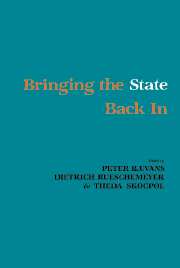Book contents
- Frontmatter
- Contents
- Preface
- Introduction
- 1 Bringing the State Back In: Strategies of Analysis in Current Research
- Part I States as Promoters of Economic Development and Social Redistribution
- Part II States and Transnational Relations
- Part III States and the Patterning of Social Conflicts
- Conclusion
- Notes on the Contributors
- Index
1 - Bringing the State Back In: Strategies of Analysis in Current Research
Published online by Cambridge University Press: 29 January 2010
- Frontmatter
- Contents
- Preface
- Introduction
- 1 Bringing the State Back In: Strategies of Analysis in Current Research
- Part I States as Promoters of Economic Development and Social Redistribution
- Part II States and Transnational Relations
- Part III States and the Patterning of Social Conflicts
- Conclusion
- Notes on the Contributors
- Index
Summary
A sudden upsurge of interest in “the state” has occurred in comparative social science in the past decade. Whether as an object of investigation or as something invoked to explain outcomes of interest, the state as an actor or an institution has been highlighted in an extraordinary outpouring of studies by scholars of diverse theoretical proclivities from all of the major disciplines. The range of topics explored has been very wide. Students of Latin America, Africa, and Asia have examined the roles of states in instituting comprehensive political reforms, helping to shape national economic development, and bargaining with multinational corporations. Scholars interested in the advanced industrial democracies of Europe, North America, and Japan have probed the involvements of states in developing social programs and in managing domestic and international economic problems. Comparative-historical investigators have examined the formation of national states, the disintegration and rebuilding of states in social revolutions, and the impact of states on class formation, ethnic relations, women's rights, and modes of social protest. Economic historians and political economists have theorized about states as institutors of property rights and as regulators and distorters of markets. And cultural anthropologists have explored the special meanings and activities of “states” in non-Western settings.
No explicitly shared research agenda or general theory has tied such diverse studies together. Yet I shall argue in this essay that many of them have implicitly converged on complementary arguments and strategies of analysis.
Information
- Type
- Chapter
- Information
- Bringing the State Back In , pp. 3 - 38Publisher: Cambridge University PressPrint publication year: 1985
Accessibility standard: Unknown
Why this information is here
This section outlines the accessibility features of this content - including support for screen readers, full keyboard navigation and high-contrast display options. This may not be relevant for you.Accessibility Information
- 939
- Cited by
